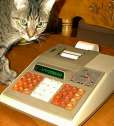Radio Shack PC-7
| Datasheet legend
Ab/c:
Fractions calculation
AC: Alternating current BaseN: Number base calculations Card: Magnetic card storage Cmem: Continuous memory Cond: Conditional execution Const: Scientific constants Cplx: Complex number arithmetic DC: Direct current Eqlib: Equation library Exp: Exponential/log functions Fin: Financial functions Grph: Graphing capability Hyp: Hyperbolic functions Ind: Indirect addressing Intg: Numerical integration Jump: Unconditional jump (GOTO) Lbl: Program labels LCD: Liquid Crystal Display LED: Light-Emitting Diode Li-ion: Li-ion rechargeable battery Lreg: Linear regression (2-var. stats) mA: Milliamperes of current Mtrx: Matrix support NiCd: Nickel-Cadmium recharg. batt. NiMH: Nickel-metal-hydrite rech. batt. Prnt: Printer RTC: Real-time clock Sdev: Standard deviation (1-var. stats) Solv: Equation solver Subr: Subroutine call capability Symb: Symbolic computing Tape: Magnetic tape storage Trig: Trigonometric functions Units: Unit conversions VAC: Volts AC VDC: Volts DC |
| ||||||||||||||||||||||||||||||||||||||||||||||||||||||||
Radio Shack PC-7
 Just how useful is a BASIC-programmable calculator with only 512 bytes of memory? Not very useful, which is probably why my Tandy PC-7, really just a Casio fx-5200P in OEM packaging, comes equipped with a memory expansion module, bringing the total amount of available memory up to a whopping 1.5 kilobytes. Yes, folks, that's 1500 characters worth of text! Almost an entire page!
Just how useful is a BASIC-programmable calculator with only 512 bytes of memory? Not very useful, which is probably why my Tandy PC-7, really just a Casio fx-5200P in OEM packaging, comes equipped with a memory expansion module, bringing the total amount of available memory up to a whopping 1.5 kilobytes. Yes, folks, that's 1500 characters worth of text! Almost an entire page!
Okay, I'm not trying to make fun of this little machine. It is an excellent scientific calculator after all, and its BASIC programmability provides useful additional functionality.
The following program is a small footprint, yet accurate implementation of the Gamma function, demonstrating the PC-7's programming model:
10 INPUT X 20 Z= ABSX 30 G=1 40 IF Z>9 THEN 80 50 G=G*Z 60 Z=Z+1 70 GOTO 40 80 G=( LNZ+ LN SQR(Z* HYP SIN(1/Z)+1/810/Z^6)-1)*Z-LNG 90 G=G+ LN SQR(2*π/Z) 100 IF X>0 THEN 120 110 G= LN(-π/X/ SIN(π*X))-G 120 PRINT G, EXPG


